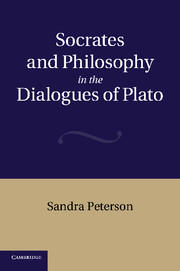Book contents
- Frontmatter
- Contents
- Acknowledgments
- Abbreviations
- Preface
- Chapter 1 Opposed hypotheses about Plato's dialogues
- Chapter 2 Socrates in the Apology
- Chapter 3 Socrates in the digression of the Theaetetus:
- Chapter 4 Socrates in the Republic, part i: speech and counter-speech
- Chapter 5 Socrates in the Republic, part ii: philosophers, forms, Glaucon, and Adeimantus
- Chapter 6 Socrates in the Phaedo: another persuasion assignment
- Chapter 7 Others' conceptions of philosophy in the Euthydemus, Lovers, and Sophist
- Chapter 8 Socrates and Plato in Plato's dialogues
- Chapter 9 Socrates and philosophy
- Bibliography
- Index of passages cited
- General index
Chapter 8 - Socrates and Plato in Plato's dialogues
Published online by Cambridge University Press: 03 May 2011
- Frontmatter
- Contents
- Acknowledgments
- Abbreviations
- Preface
- Chapter 1 Opposed hypotheses about Plato's dialogues
- Chapter 2 Socrates in the Apology
- Chapter 3 Socrates in the digression of the Theaetetus:
- Chapter 4 Socrates in the Republic, part i: speech and counter-speech
- Chapter 5 Socrates in the Republic, part ii: philosophers, forms, Glaucon, and Adeimantus
- Chapter 6 Socrates in the Phaedo: another persuasion assignment
- Chapter 7 Others' conceptions of philosophy in the Euthydemus, Lovers, and Sophist
- Chapter 8 Socrates and Plato in Plato's dialogues
- Chapter 9 Socrates and philosophy
- Bibliography
- Index of passages cited
- General index
Summary
SOCRATES IN PLATO'S DIALOGUES
Consideration of Socrates' behavior in putatively doctrinal dialogues confirms so far my hypothesis that within the dialogues of Plato Socrates stays the same examining figure of the Apology. I do not say that my hypothesis is conclusively established. I think it at least as likely as the alternative hypothesis that Socrates speaks doctrine of a developing Plato.
The hypothesis that the Socrates of Plato's dialogues is deeply the same explains, for the dialogues I have considered, what Socrates is doing – he is engaging in the activity in which, as he says in the Apology, he spent his life. In the Apology he calls it his philosophizing; he says it comprises asking whether people care for the condition of their souls, and examining or testing them to find out if they do if they say that they do. He discerns their care or lack of it by observing their reaction to being shown not to know what they think they know. He reproaches if they seem untroubled. And all of that, he says, is persuading people to care about the way they live.
In the Theaetetus digression, the Republic, and the Phaedo we saw only a certain stage of the process of examination – the stage of the interlocutor's revealing himself by his reaction to Socrates' apparent teaching. Disclosing to his interlocutors what they are inclined to believe is the first step of the process of examination that he is always encouraging.
- Type
- Chapter
- Information
- Socrates and Philosophy in the Dialogues of Plato , pp. 216 - 235Publisher: Cambridge University PressPrint publication year: 2011



